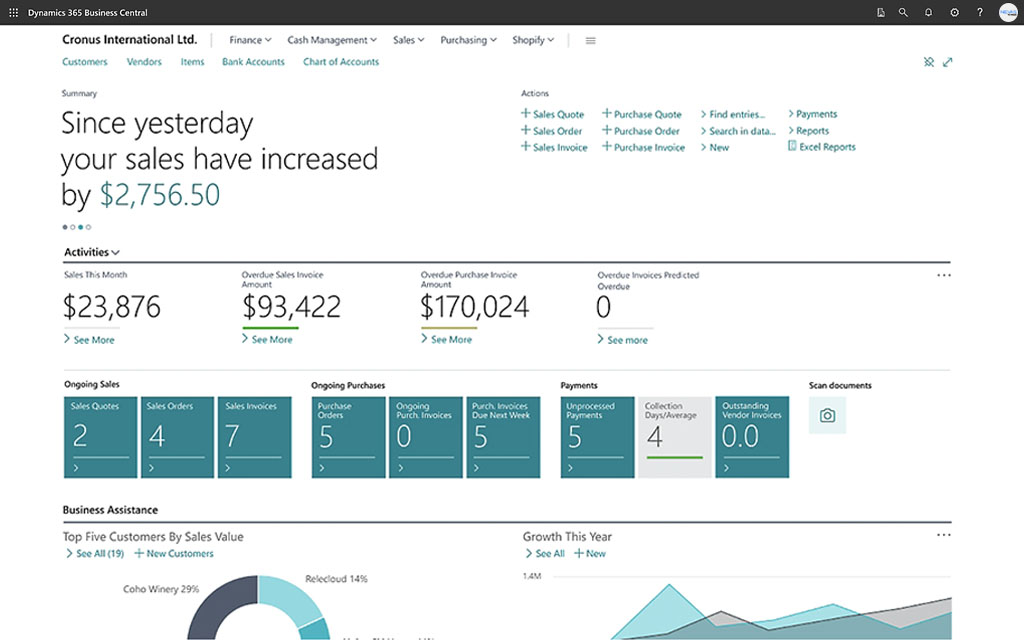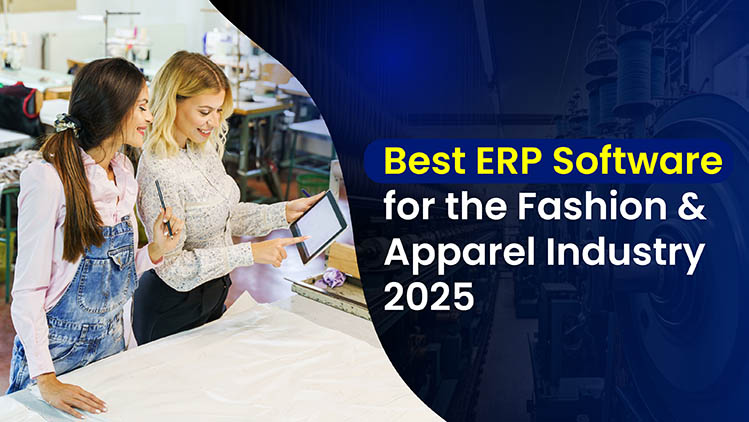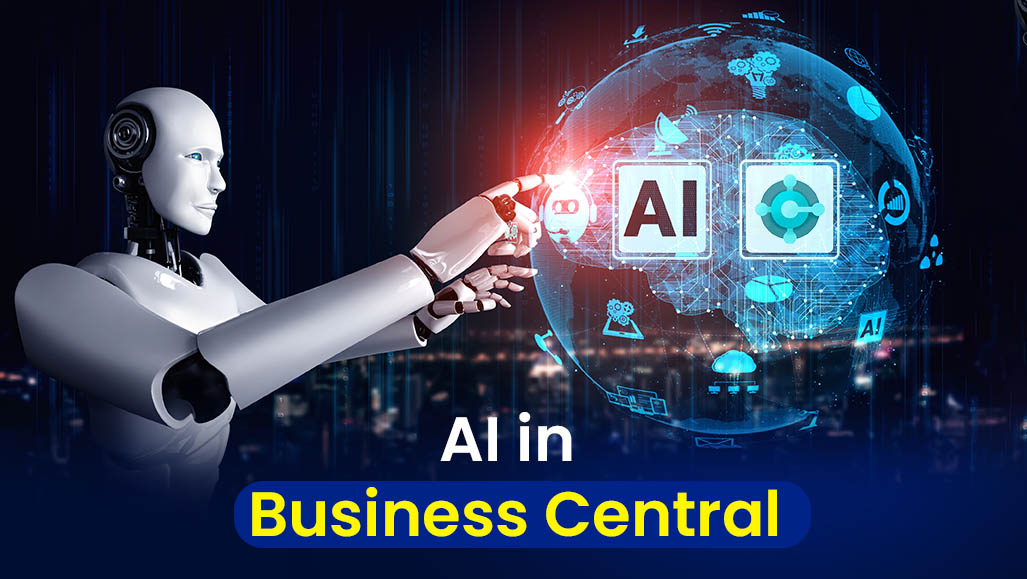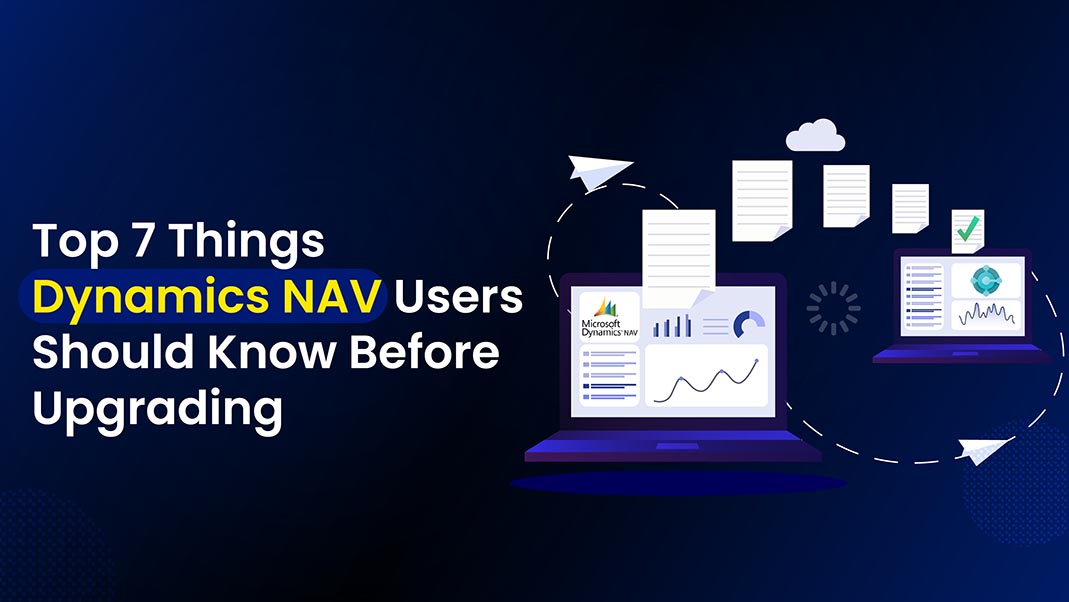Top 10 Best ERP Software for the Fashion & Apparel Industry
The fashion industry is experiencing rapid technological advancements and shifting consumer expectations. Trends like fast fashion, sustainability, and omnichannel shopping are reshaping the industry, necessitating a robust operational backbone. ERP software enables businesses to overcome challenges like inventory mismanagement, production delays, and compliance complexities.
Thus, staying competitive in the fashion and apparel industry requires more than creativity and innovation. Businesses must also leverage Enterprise Resource Planning (ERP) software to streamline operations, enhance supply chain visibility, and embrace sustainability. This blog explores the top ERP software tailored for the fashion industry, helping businesses optimize processes and prepare for future challenges.
Why ERP Matters in Fashion & Apparel
The fashion industry operates in a dynamic environment characterized by complexities that demand robust technological solutions. ERP systems address these challenges by unifying processes, enhancing efficiency, and enabling agility. Here’s why ERP is indispensable for the sector:
- Complex Supply Chain Management
Fashion brands often deal with a labyrinth of suppliers, manufacturers, and logistics partners. ERP systems centralized supply chain data, improving coordination, transparency, and decision-making. - Rapid Trend Changes
The fast fashion model thrives on rapid turnarounds. ERP solutions with predictive analytics and trend forecasting help brands respond swiftly to market demands, minimizing lead times. - Inventory Accuracy
With diverse product variations like sizes, colors, and styles, maintaining accurate inventory is crucial. ERP tools offer real-time inventory tracking, reducing overstocking and stock outs. - Multichannel Sales Integration
From brick-and-mortar stores to e-commerce platforms, ERP systems ensure seamless integration across sales channels, delivering a unified customer experience. - Sustainability and Compliance Tracking
ERP solutions provide tools to monitor and report on compliance with ethical sourcing and environmental standards making sustainability the next normal.
Top Considerations for Apparel ERP Software Selection in 2024/2025
Selecting the right ERP software requires a forward-looking approach. As fashion businesses prepare for 2025, these features should top their checklist:
- Advanced supply chain management should provide real-time visibility into every link of the supply chain.
- AI-driven inventory tracking enables smarter stock management through predictive analytics.
- Predictive design and product lifecycle management tools help anticipate design trends and efficiently manage product life cycles.
- Real-time trend forecasting capabilities, powered by AI, allow businesses to stay ahead of consumer preferences.
- Seamless integration with design tools like CAD and PLM software ensures smooth workflows.
- Omnichannel e-commerce platform compatibility supports unified operations across online and offline channels.
- Sustainable cost management and financial reporting ensure profitability while meeting sustainability goals.
- Cybersecurity and data protection mechanisms are essential for protecting sensitive customer and business data.
Strategic Approach to Selecting the Right ERP Solutions for the Fashion Industry in 2025
Selecting an ERP for the fashion industry requires a strategic approach. Here are key considerations:
- Align with Business Objectives: Ensure the ERP software supports your strategic goals, such as expanding global reach and enhancing customer experiences.
- Holistic Needs Assessment: Conduct a comprehensive evaluation involving stakeholders from various departments to address critical areas like inventory management and compliance.
- Future-Proof Investments: Choose an ERP Software that integrates with emerging technologies like AI and IoT. Cloud-based solutions offer scalability and flexibility for future growth.
- Scalability and Adaptability: Select an ERP system that can grow with your business and adapt to industry changes, supporting increased workloads and custom workflows.
- Total Cost of Ownership (TCO) Analysis: Evaluate both upfront and ongoing costs, including indirect impacts like downtime, to ensure the ERP system delivers long-term financial value.
Top 10 ERP Software for the Fashion Industry
Let’s dive deeper into the best ERP software for the fashion and apparel industry, each offering unique features to address specific business needs.
1. Microsoft Dynamics 365 Business Central for Fashion

Dynamics 365 Business Central is a dynamic ERP software that integrates seamlessly with the Microsoft ecosystem. It empowers fashion brands to streamline their operations while staying flexible and scalable.
Key Features:
- AI-driven insights for real-time trend analysis and demand forecasting.
- Customizable workflows for streamlined design, production, and supply chain management.
- Real-time inventory tracking to improve supply chain visibility.
- Seamless integration with Microsoft tools like Excel and Power BI.
Why Choose Microsoft Dynamics 365 Business Central:
Its modular design and robust analytics make it ideal for businesses looking to scale operations, leverage insights, and ensure long-term growth.
Dynamics 365 Business Central Plans and Pricing
- Dynamics 365 Business Central Essentials – $70 user/month
- Dynamics 365 Business Central Premium – $100 user/month
- Dynamics 365 Business Central Team Members – $8 user/month
Learn more about Business Central pricing.
2. Infor Fashion PLM
Infor Fashion PLM is designed specifically for the complexities of the fashion industry, focusing on enhancing product lifecycle management (PLM) to support innovation and speed-to-market.
Key Features:
- Centralized design data to enable collaborative workflows.
- Real-time monitoring of production timelines for efficient control.
Why Choose Infor Fashion PLM:
Infor Fashion PLM is perfect for brands prioritizing sustainability, innovation, and fast-paced product launches in highly competitive markets.
3. SAP Fashion Management Solution
SAP offers enterprise-grade ERP solutions tailored for large fashion brands, providing tools to unify operations and manage global supply chains.
Key Features:
- Integration of retail and wholesale channels into one platform.
- Advanced forecasting tools for precise demand planning.
- Comprehensive support for multi-channel marketing and distribution networks.
SAP is an excellent choice for global brands looking to streamline supply chain operations and maintain operational efficiency across regions.
4. Oracle NetSuite
Oracle NetSuite is a flexible cloud-based ERP system that caters to fashion brands of all sizes, offering scalability and customization.
Key Features:
- Industry-specific dashboards for actionable insights.
- Financial and cost management tools for better resource allocation.
Its adaptability and strong cloud infrastructure make it a favorite for growing businesses needing a robust yet customizable solution.
5. BlueCherry ERP
BlueCherry ERP by CGS is a complete solution tailored for fashion, apparel, and footwear businesses, helping them bridge design creativity with operational efficiency.
Key Features:
- Advanced production management tools for streamlined workflows.
- Real-time integration with design and PLM systems.
- Data-driven reporting and analytics for better decision-making.
It’s ideal for brands aiming to reduce time-to-market while ensuring smooth transitions from design to production.
6. Accellar Fashion ERP
Accellar Fashion ERP is specifically designed to meet the needs of small to medium-sized fashion businesses, offering cost-effective solutions for inventory and production management. With AI-powered analytics for demand forecasting and detailed tools for managing sizes, colors, and material configurations, Accellar is an ideal choice for smaller brands seeking robust functionality and scalability at a budget-friendly price.
7. Epicor Fashion PLM
Epicor Fashion PLM is renowned for its advanced features that support collaborative product development and operational expansion. With tools designed for seamless collaboration in design and production workflows, it is an ideal choice for brands looking to scale into new markets while promoting team collaboration and enhancing operational efficiency.
8. PTC Windchill
PTC Windchill is a future-focused ERP system that enables digital transformation in fashion with prototyping tools and advanced sustainability tracking, making it ideal for brands prioritizing innovation and eco-friendly practices.
9. Centric PLM
Centric PLM streamlines product lifecycle management by offering a centralized platform for design and supplier collaboration. It also includes sustainability tracking tools to support ethical sourcing, making it an ideal choice for businesses focused on collaboration and maintaining an ethical supply chain.
10. NGC Software
NGC Software is tailored to improve supply chain visibility and promote sustainability, making it a top ERP choice for modern fashion brands. With real-time supply chain tracking for enhanced transparency, NGC is ideal for brands that prioritize operational clarity and sustainability to meet the demands of today’s consumers.
The Microsoft Dynamics 365 Business Central Advantage
Dynamics 365 Business Central for Fashion stands out for its flexibility and innovation. It’s especially valuable for small to medium-sized businesses looking to scale operations while managing costs effectively. Key benefits include:
- Seamless Integration: Built-in compatibility with Microsoft Office and Power BI enables effortless reporting and collaboration.
- AI and Analytics: Leverage real-time insights for trend forecasting and operational efficiency.
- Scalability: Adapt to changing business needs, whether you’re a startup or an established brand.
- Global Compliance: Stay ahead of regulations with tools for tax and trade compliance.
Future of ERP in Fashion Technology
Fashion ERP systems are evolving to meet the industry’s need for speed, sustainability, and innovation:
- AI-Driven Personalization: Predict customer preferences and design collections tailored to their tastes.
- Sustainable Supply Chain Management: Implement circular economy practices and reduce environmental impact.
- Blockchain for Transparency: Ensure traceability of materials from sourcing to final sale.
- AR/VR in Design and Prototyping: Create immersive experiences for customers and designers alike.
- IoT Integration: Use smart sensors to monitor inventory and production efficiency in real time.
Redefine Fashion Excellence with Microsoft Dynamics 365 Business Central and Nevas Technologies
ERP Software is no longer an option, it’s the lifeline of innovation. Microsoft Business Central emerges as a game-changer, seamlessly connecting creativity with operational precision. With advanced AI, real-time analytics, and robust cloud capabilities, Nevas Technologies enables fashion brands to break barriers and set new industry benchmarks.
As digital transformation reshapes the fashion landscape, having the right ERP system isn’t just an advantage—it’s your differentiator. Dynamics 365 Business Central, combined with Nevas Technologies proven expertise, delivers more than just solutions; it provides a future-ready strategy. From forecasting trends with precision to building sustainable supply chains, we empower your brand to tackle today’s challenges and seize tomorrow’s opportunities.
The future of fashion starts now. Partner with Nevas Technologies a Microsoft Dynamics 365 Business Central Partner to turn your vision into reality and unlock your competitive edge.
Contact our team today and step into the future of fashion innovation.
Frequently Asked Questions
1. How will ERP evolve for fashion businesses in 2025?
ERP will focus on AI, blockchain, and sustainability integrations to meet industry demands.
2. What skills are needed for ERP implementation?
Expertise in data analysis, cloud computing, and cybersecurity is essential.
3. How can fashion brands ensure ERP sustainability?
By choosing solutions that align with environmental and ethical standards.
4. What are the cost implications of advanced ERP systems?
Initial investments are high but yield significant ROI through efficiency and growth.
5. How to measure ERP digital transformation success?
Track metrics like operational efficiency, customer satisfaction, and financial performance.




